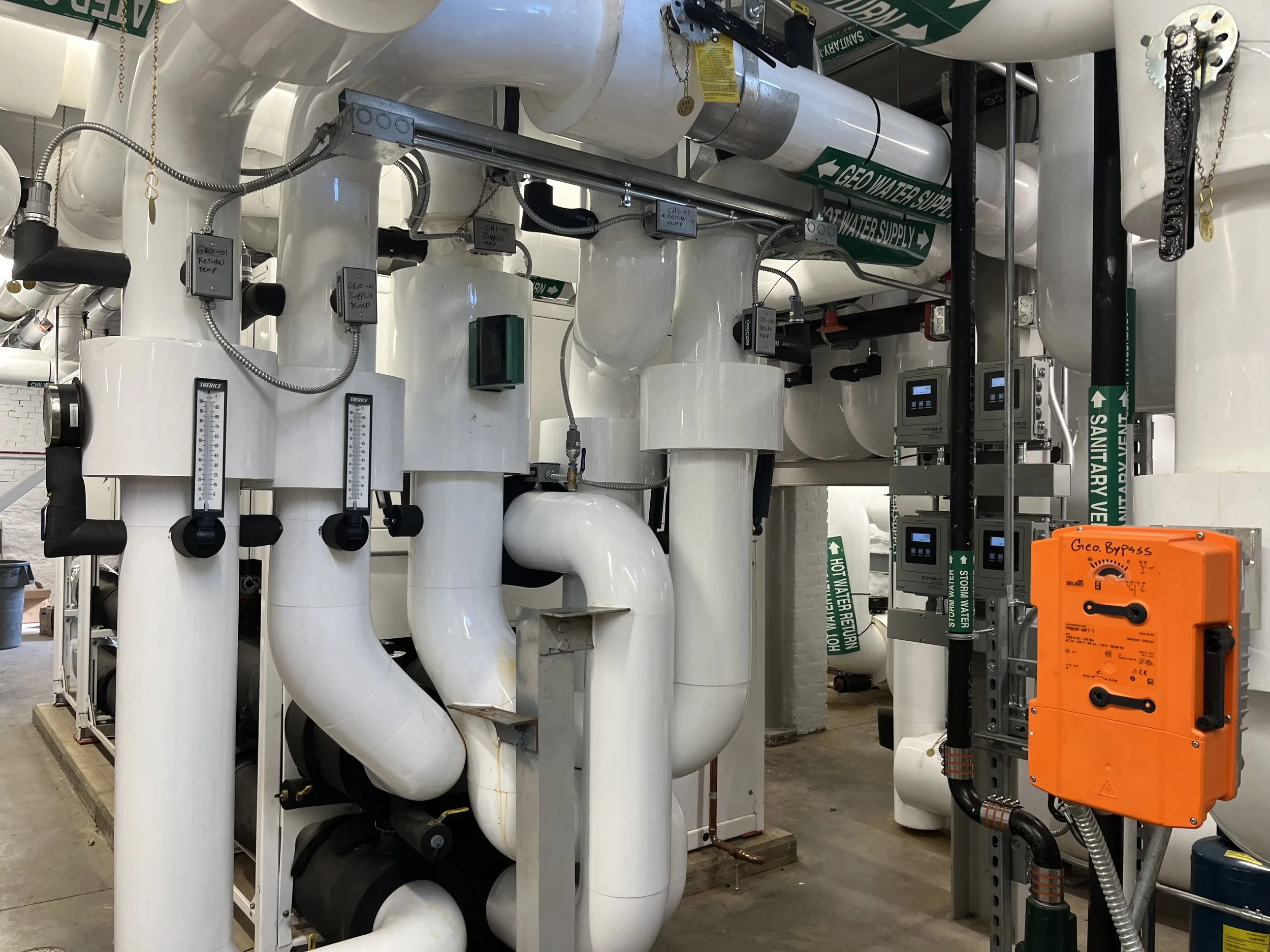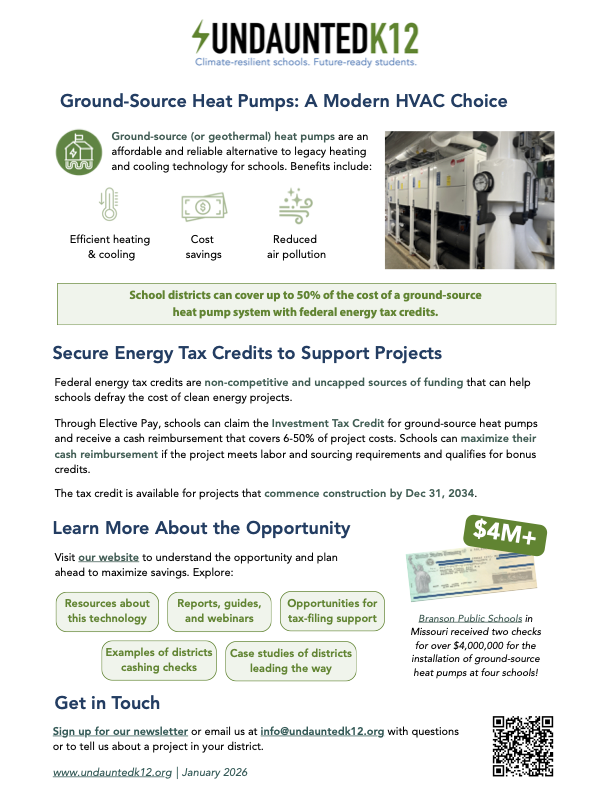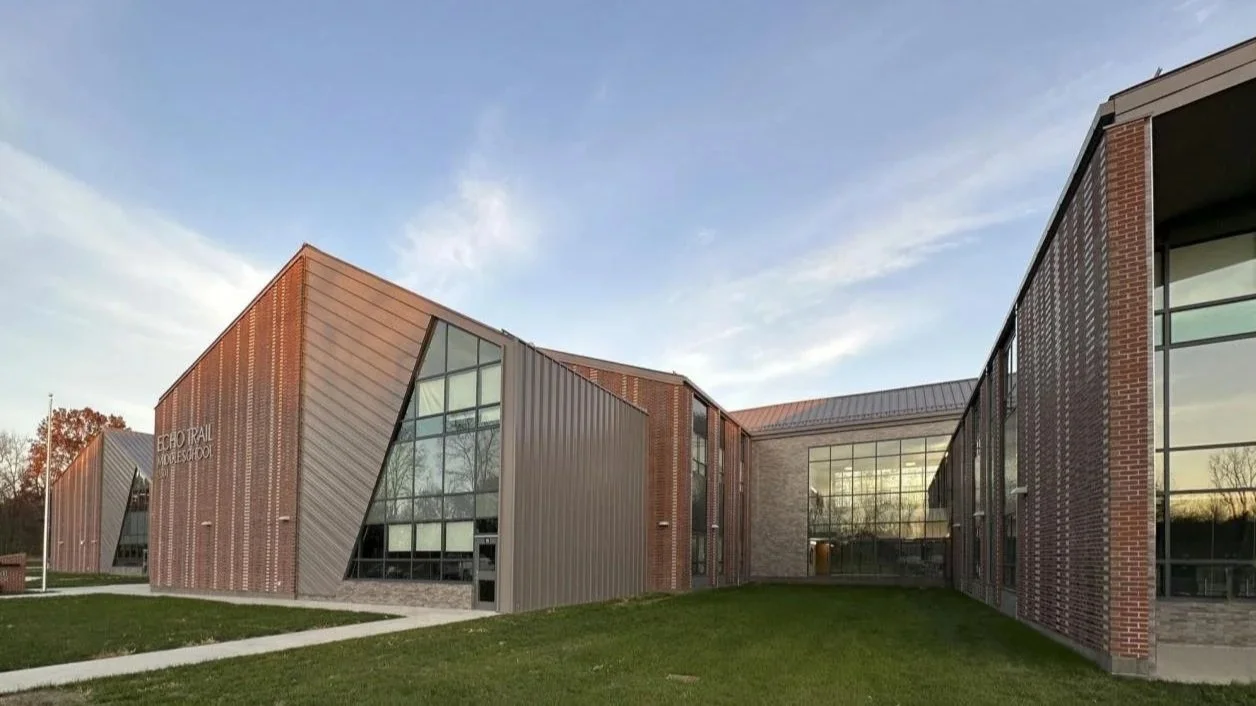
Ground-Source Heat Pumps: Full Speed Ahead
Plan ahead and move projects forward
Ground-source heat pumps are a cost-saving, clean alternative to legacy heating and cooling technology in schools.
School districts can qualify for federal tax credits for up to 50% of the cost of a ground-source heat pump system. Elective Pay allows schools to convert tax credits into a cash reimbursement.
Check out examples of schools from across the country that have installed ground-source heat pumps and received cash reimbursements.
While the July 2025 budget reconciliation law made changes to other energy tax credits, the tax credit for ground-source heat pumps remains intact and unaffected by the law.
What is the Opportunity for Schools?
Ground-source heat pumps (aka geothermal heat pumps) provide heating by moving heat from the ground into buildings and doing the reverse - moving heat from buildings into the ground - to provide cooling.
Efficient Heating & Cooling: Ground-source heat pumps are an efficient heating and cooling solution for new and existing buildings. Many classrooms are not equipped with cooling. Overheated classrooms are associated with lower test scores and the cause of school closures.
Cost Savings: Ground-source heat pumps help schools save money. Because they are highly efficient, they can reduce utility costs. And schools can earn a cash reimbursement from the federal government for installing them.
Reduced Air Pollution: Ground-source heat pumps promote clean air. Ground-source heat pumps run on electricity and do not require schools to burn fuels on site. As all-electric systems, they reduce the greenhouse gas emissions produced by buildings. Cleaner air benefits the whole community.
Additional Resources About the Opportunity
Ground-Source Heat Pumps: A Healthy and Affordable HVAC Choice for K-12 Schools
Read more about the opportunity to create healthy and resilient learning environments with cost-effective ground-source heat pumps.
Schools can claim the Investment Tax Credit (Sec. 48) through Elective Pay for ground-source heat pumps (aka geothermal heat pumps).
Reimbursements may range from 6% to 50% of the project costs of a ground-source heat pump. Schools can maximize their credit if the project meets prevailing wage and apprenticeship requirements or exceptions, uses domestic content, and is sited in an “energy community”.
The use of tax-exempt financing will reduce the eligible reimbursement. Tax credits may be combined with other sources of funding, such as utility rebates or state grants. Discuss this with a tax professional.
The tax credit for ground-source heat pumps is available for projects that were placed into service on or after Jan 1, 2023 and that commence construction by Dec 31, 2034.
Tax Credits for Ground-Source Heat Pump Projects
Additional Information:
Cornell Law School: 26 U.S. Code § 48 - Energy credit
IRS: Prevailing Wage & Apprenticeship Overview and FAQs about PWA
U.S. Department of Labor: Prevailing Wage Guidance
Baker Tilly: Energy Communities Map
Making the Most of Energy Tax Credits: Unlocking Federal Investments in Your School District
Understand how to make the most of energy tax credits for your ground-source heat pump project.
School Districts Leading The Way
Schools across the country have already installed ground-source heat pumps and received cash reimbursements on their projects through Elective Pay. See below some examples of schools and districts leading the way and benefitting from this clean, cost-saving technology.
Nevada
Kentucky
Minnesota
Share your ground-source heat pump project with us to be featured here next!
Jefferson County Public Schools in Kentucky receives a $1,824,613 check!
Westwood Public Schools in Massachusetts receives a $5,055,655 check!
North Fayette Valley Community School District in Iowa receives a $873,483 check!
Seattle Public Schools in Washington receives a $7,970,439 check!
Tax Credits for Ground-Source Heat Pumps Remain Intact
Despite the passage of the July 2025 budget reconciliation law, the tax credit for ground-source heat pumps (Sec. 48) remains intact, including the opportunity to enhance the credit by meeting prevailing wage and apprenticeship, the domestic content bonus credit, and the energy communities bonus credit.
This tax credit is not subject to any of the new Prohibited Foreign Entity (PFE) rules that apply to solar energy, geothermal energy, and storage systems.
The tax credit for schools that install ground-source heat pumps (Sec. 48) is different from the tax credits on which homeowners rely (Sec. 25D). The tax credit for homeowners installing ground-source heat pumps will expire on Dec 31, 2025.
Additional Resources for Tax-Filing Support
We Build Progress & Lawyers for Good Government (L4GG) Monthly Elective Pay Office Hours
Thursday, March 12 at 1pm ET
We Build Progress and L4GG host monthly office hours on Elective Pay. Share your clean energy project project plans, talk through roadblocks, and ask your questions.
Internal Revenue Service (IRS) Monthly Elective Pay Office Hours
Wednesday, March 18 at 1pm ET
The IRS hosts monthly office hours dedicated to Elective Pay and energy tax credits. Attend to ask your questions.
L4GG has launched the Elective Pay Sprint Hub to help entities maximize energy tax credits while they are still available. Complete the intake form and receive assistance for your project.
Questions? Reach out to us at: info@undauntedk12.org.
The information on this page represents our best understanding of certain tax provisions for general informational purposes only and is not itself tax guidance. Please consult qualified tax professionals about your specific circumstances and refer to guidance issued by the IRS for detailed information on the rules associated with energy tax credits, elective pay, and other relevant tax provisions.














